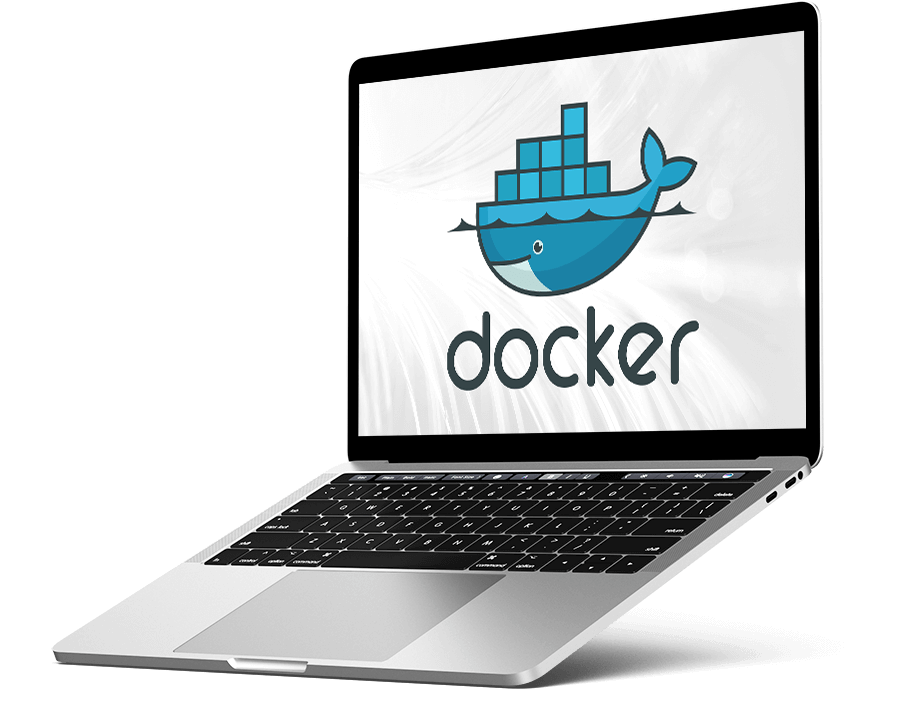
★ ★ ★ ★ ★ 4.9 Client Rated
TRUSTED BY THE WORLD’S MOST ICONIC COMPANIES.
★ ★ ★ ★ ★ 4.9 Client Rated

Integrating Docker with DevOps processes enables streamlined automation and enhanced collaboration. We guide organizations through Docker adoption, embedding infrastructure automation, CI/CD pipelines, and agile DevOps practices to foster a flexible, reliable development environment that drives rapid, quality-focused delivery.
We specialize in transforming applications with Docker containers, enabling efficient, scalable deployments tailored for diverse environments. Our team leverages Docker Swarm and Kubernetes to orchestrate containers, modernizing applications and infrastructures by converting monolithic structures into agile, containerized solutions.
Modernizing legacy systems with Docker offers enhanced scalability, portability, and efficiency. Our experts assess, refactor, and containerize legacy applications, aligning them with today’s infrastructure standards. This modernization approach accelerates digital transformation, enabling businesses to leverage existing applications within flexible, containerized frameworks.
Automating code integration, testing, and deployment is essential to accelerating development. Our team implements Docker-based CI/CD pipelines with tools like GitLab CI and Jenkins, enabling continuous, efficient workflows that boost code quality and streamline deployment processes for enhanced reliability.
We design, configure, and optimize Docker Swarm clusters for high availability, performance, and fault tolerance. Leveraging Docker’s native orchestration capabilities, we ensure efficient resource utilization, whether on-premises or in the cloud, creating a robust infrastructure for containerized applications.
By breaking down applications into modular, containerized microservices, we enable greater flexibility and scalability for modern deployments. Using Docker alongside orchestration tools like Kubernetes, we create resilient architectures that offer fault tolerance and on-demand scalability, allowing businesses to adapt to changing demands with ease.
Our cloud-native services empower businesses to build or migrate applications using Docker, Kubernetes, and other cloud technologies. We design resilient, scalable, and portable applications suited for modern cloud environments, ensuring smooth transitions and high performance, whether developing from scratch or modernizing existing solutions.

Openpay needed a substantial upgrade to its payment processing capabilities, particularly focusing on mobile applications. The aim was to integrate advanced technologies for secure credit card transactions and to enhance core business functionalities. The project demanded extensive technical expertise to support mobile payment initiatives and refine essential system processes.

As strategic partners, we were enlisted to expedite the expansion of their internal teams across various critical work verticals, including pivotal areas such as Frontend, Backend, Business Intelligence (BI), Integrations, and Issuing, among others. Leveraging our enterprise-level engineering and team augmentation expertise to swiftly identify, recruit, and onboard expert engineers with strong technical acumen.

Swiss Medical Group set out to revolutionize their affiliate app by integrating agile development and advanced technology. The aim was to modernize the app, address outdated systems, and create a unified, intuitive experience across all devices. This project sought to enhance design, boost performance, and streamline operations to deliver a seamless user experience.

We are eager to learn about your business objectives, understand your tech requirements, and specific Docker needs.

We can assemble your team of experienced, timezone aligned, expert Docker developers within 7 days.

Our Docker developers can quickly onboard, integrate with your team, and add value from the first moment.
Docker is a powerful containerization platform that automates the deployment, management, and scaling of applications within isolated, lightweight containers. By encapsulating applications along with their dependencies, Docker creates a consistent environment that allows applications to run reliably across various systems, from development to production. Docker containers package everything an application needs, including libraries, runtime, and configuration files, into a standardized unit, making it easier to move and manage applications.
Docker operates through its core component, the Docker Engine, which provides APIs and a command-line interface for seamless control over containerized environments. This technology supports faster deployments, greater resource efficiency, and simplified application updates, enabling teams to build, test, and release software with enhanced agility and scalability. Docker’s container-based approach has become essential for modern development practices, powering microservices architectures, DevOps workflows, and continuous integration and deployment (CI/CD) pipelines.

Docker is widely used for its ability to streamline application deployment, improve scalability, and reduce the complexities of managing different environments. With Docker, applications are packaged into containers that include everything they need to run—libraries, dependencies, and configuration—enabling them to operate consistently across different computing environments. This consistency reduces conflicts between development, testing, and production environments, minimizing errors and accelerating the development process.
Additionally, Docker supports faster, more efficient resource utilization. Containers are lightweight and share the host system’s operating system, making them quicker to deploy and more resource-efficient than traditional virtual machines. Docker’s compatibility with orchestration tools like Kubernetes further enhances scalability, allowing organizations to manage and automate thousands of containers across large clusters. Overall, Docker’s containerization approach enhances flexibility, speeds up deployment, and provides a reliable way to manage applications, making it an essential tool for modern DevOps and CI/CD workflows.

Docker integrates smoothly with DevOps workflows, facilitating automation, collaboration, and efficient CI/CD processes. By embedding Docker into DevOps practices, teams can automate testing, deployment, and infrastructure management, driving agility, reducing time to delivery, and improving overall software quality.
Docker enables rapid scaling of applications to handle increased demand without added overhead. Containers are lightweight and can be quickly replicated to scale horizontally, allowing businesses to respond dynamically to changing workloads. This scalability is essential for high-traffic applications and cloud-native environments.
Docker allows version control over application dependencies, ensuring reproducibility and simpler maintenance. This versioning enables teams to roll back to previous configurations if needed and manage dependencies effectively, reducing compatibility issues and making applications easier to update.
Docker facilitates faster and more efficient application deployment, which helps accelerate time-to-market. Containers are quick to start, stop, and restart, making them ideal for agile development practices and continuous integration/continuous deployment (CI/CD) pipelines. This speed is critical for organizations focused on rapid innovation and delivery.
Docker minimizes resource consumption by running containers on a shared operating system. This approach improves server utilization, reduces infrastructure costs, and optimizes performance. Docker’s lightweight nature means more applications can run on the same hardware compared to traditional virtual machines, enhancing operational efficiency.
Docker containers are designed to run consistently across any environment, whether on local machines, cloud servers, or hybrid setups. This portability simplifies deployment and allows applications to move seamlessly between different infrastructures, making Docker a valuable tool for multi-cloud and hybrid cloud strategies.
With Docker, each container runs in its isolated environment, complete with its dependencies, libraries, and configurations. This isolation prevents conflicts between applications, allowing for reliable deployments and a more stable application environment. Docker’s isolated approach enhances security by containing potential issues within individual containers.
Docker provides a unified environment for development, testing, and production, ensuring that applications behave the same way across each stage. By maintaining consistency, Docker reduces compatibility issues and streamlines the transition from development to deployment, leading to fewer errors and a smoother workflow.
Docker is primarily used to package applications and their dependencies into containers, creating portable, consistent environments. By containerizing applications, Docker enables seamless transitions between development, testing, and production environments, ensuring that applications run reliably regardless of the underlying system.
Docker is a key enabler of microservices, where applications are broken down into smaller, independent services. Each microservice can be containerized, allowing developers to update, scale, and deploy specific components independently. This approach boosts flexibility, scalability, and resilience across distributed systems.
Docker is widely used in CI/CD pipelines to automate testing, building, and deployment processes. With Docker containers, each stage of the pipeline can occur in a consistent, isolated environment, reducing conflicts and speeding up delivery times. This approach improves code quality and enhances software delivery efficiency.
Docker allows organizations to modernize legacy applications by containerizing them, improving their portability, scalability, and resource efficiency. By running legacy applications in containers, businesses can extend the lifespan of their software and integrate older applications into modern, cloud-based environments.
Docker containers provide a standardized unit that can run on any infrastructure, from on-premises data centers to public cloud platforms. This flexibility supports multi-cloud and hybrid cloud strategies, giving organizations the freedom to deploy applications in the best-suited environment for their needs without being tied to a single provider.
Docker enables the creation of isolated testing environments that are identical to production setups. This capability allows developers to test applications in realistic conditions, catching bugs early and reducing the likelihood of issues in production. Docker’s ability to quickly spin up and destroy containers also makes it ideal for running automated tests.
Specialized tools for handling service discovery, load balancing, networking, and secure storage of Docker container images. These solutions enhance network reliability, simplify service management, and improve container deployment efficiency across clusters.
Secure and efficient container runtimes and image-building tools designed to package, build, and run Docker containers. These technologies support various runtime environments and simplify the process of creating optimized, secure container images.
Advanced platforms and tools designed to streamline the deployment, scaling, and orchestration of containerized applications across distributed environments. These technologies ensure efficient resource allocation, fault tolerance, and automated management for container clusters.
Flexible tools that simplify provisioning, configuring, and managing infrastructure resources in any environment. They support Infrastructure as Code (IaC) practices, allowing for scalable and consistent management of containerized applications.
Powerful systems for collecting, analyzing, and visualizing data from containerized applications and infrastructure. These tools offer comprehensive monitoring and logging, helping organizations gain insight into performance metrics, troubleshoot issues, and maintain optimal uptime.
Integrated solutions that automate the entire development pipeline, enabling seamless code integration, testing, and deployment. These CI/CD tools work alongside Docker to improve workflow efficiency, speed up deployment cycles, and ensure code quality.
We build high-performance software engineering teams better than everyone else.
Coderio specializes in Docker technology, delivering scalable and secure solutions for businesses of all sizes. Our skilled Docker developers have extensive experience in building modern applications, integrating complex systems, and migrating legacy platforms. We stay up to date with the latest Docker advancements to ensure your project is a success.
We have a dedicated team of Docker developers with deep expertise in creating custom, scalable applications across a range of industries. Our team is experienced in both backend and frontend development, enabling us to build solutions that are not only functional but also visually appealing and user-friendly.
No matter what you want to build with Docker, our tailored services provide the expertise to elevate your projects. We customize our approach to meet your needs, ensuring better collaboration and a higher-quality final product.
Our engineering practices were forged in the highest standards of our many Fortune 500 clients.
We can assemble your Docker development team within 7 days from the 10k pre-vetted engineers in our community. Our experienced, on-demand, ready talent will significantly accelerate your time to value.
We are big enough to solve your problems but small enough to really care for your success.
Our Guilds and Chapters ensure a shared knowledge base and systemic cross-pollination of ideas amongst all our engineers. Beyond their specific expertise, the knowledge and experience of the whole engineering team is always available to any individual developer.
We believe in transparency and close collaboration with our clients. From the initial planning stages through development and deployment, we keep you informed at every step. Your feedback is always welcome, and we ensure that the final product meets your specific business needs.
Beyond the specific software developers working on your project, our COO, CTO, Subject Matter Expert, and the Service Delivery Manager will also actively participate in adding expertise, oversight, ingenuity, and value.
Accelerate your software development with our on-demand nearshore engineering teams.